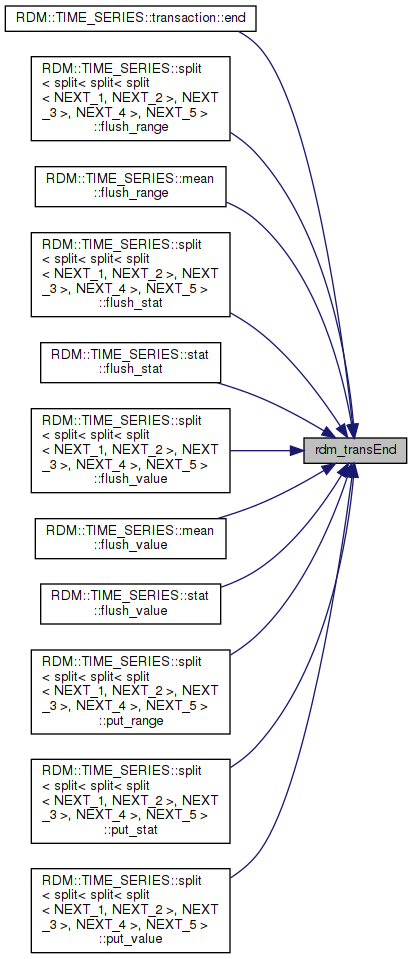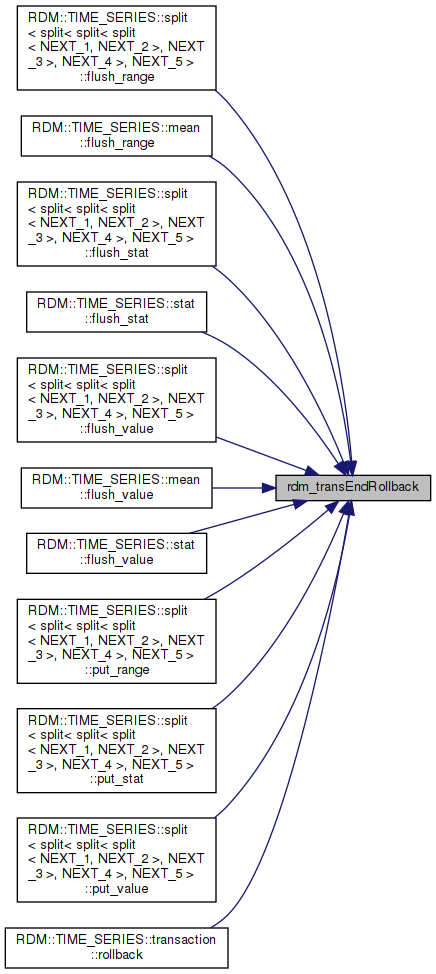
|
Functions | |
| RDM_RETCODE | rdm_transEnd (RDM_TRANS trans) |
| End a transactional operation. More... | |
| RDM_RETCODE | rdm_transEndRollback (RDM_TRANS trans) |
| End a transactional operation with a rollback. More... | |
| RDM_RETCODE | rdm_transFree (RDM_TRANS hTrans) |
| Free a transaction handle. More... | |
| RDM_RETCODE | rdm_transPrecommit (RDM_TRANS trans) |
| Precommit a transactional operation (Two-Phase Commit phase 1) More... | |
| RDM_RETCODE | rdm_transRollback (RDM_TRANS hTrans) |
| Rollback transactional operations. More... | |
Detailed Description
See Transactions and Locking for a more detailed description.
The core database transaction API. These functions are located in RDM DB Engine Library. Linker option:
-lrdmrdmA transaction handle can be instantiated using rdm_dbStartUpdate, rdm_dbStartRead, or rdm_dbStartSnapshot.
Function Documentation
◆ rdm_transEnd()
| RDM_RETCODE rdm_transEnd | ( | RDM_TRANS | trans | ) |
#include <rdmtransapi.h>
End a transactional operation.
rdm_transEnd() will process a transaction point. If the transaction point is the root then the transaction will be committed and the changes made a part of the database. If the transaction point is not the root then the transaction point and any subsequent transaction points will be deleted. If a handle to subsequent transaction points was kept it should be discarded as the used of an invalided transaction handle is undefined.
Any read locks that were granted when or after the specified transaction point was created will be freed.
See Transactions and Locking for a more detailed description.
- Return values
-
sOKAY Normal, successful return.
- Parameters
-
[in] trans A valid RDM transaction handle
- Examples
- c-core/13_core/core13Example_main.c, c-core/28_core/core28Example_main.c, c-core/29_core/core29Example_main.c, and c-core/30_core/core30Example_main.c.
Referenced by RDM::TIME_SERIES::transaction< NEXT >::end(), RDM::TIME_SERIES::split< split< split< split< NEXT_1, NEXT_2 >, NEXT_3 >, NEXT_4 >, NEXT_5 >::flush_range(), RDM::TIME_SERIES::mean< N, AGGREGATE_T, AGG_ELEMENT_T, NEXT >::flush_range(), RDM::TIME_SERIES::split< split< split< split< NEXT_1, NEXT_2 >, NEXT_3 >, NEXT_4 >, NEXT_5 >::flush_stat(), RDM::TIME_SERIES::stat< N, STAT_T, NEXT >::flush_stat(), RDM::TIME_SERIES::split< split< split< split< NEXT_1, NEXT_2 >, NEXT_3 >, NEXT_4 >, NEXT_5 >::flush_value(), RDM::TIME_SERIES::mean< N, AGGREGATE_T, AGG_ELEMENT_T, NEXT >::flush_value(), RDM::TIME_SERIES::stat< N, STAT_T, NEXT >::flush_value(), RDM::TIME_SERIES::split< split< split< split< NEXT_1, NEXT_2 >, NEXT_3 >, NEXT_4 >, NEXT_5 >::put_range(), RDM::TIME_SERIES::split< split< split< split< NEXT_1, NEXT_2 >, NEXT_3 >, NEXT_4 >, NEXT_5 >::put_stat(), and RDM::TIME_SERIES::split< split< split< split< NEXT_1, NEXT_2 >, NEXT_3 >, NEXT_4 >, NEXT_5 >::put_value().

◆ rdm_transEndRollback()
| RDM_RETCODE rdm_transEndRollback | ( | RDM_TRANS | trans | ) |
#include <rdmtransapi.h>
End a transactional operation with a rollback.
rdm_dbEndRollback() will rollback an update transaction up to the specified transaction point. If the transaction point is the root then the transaction will be aborted and all locks will be freed. If the transaction point is not the root then the transaction point and any subsequent transaction points will be invalidated. If a handle to subsequent transaction points was kept it should be discarded as the used of an invalided transaction handle is undefined.
See Transactions and Locking for a more detailed description.
- Return values
-
sOKAY Normal, successful return. eNOUPDATE Transaction handle does not refer to an update transaction.
- See also
- rdm_dbStartUpdate
- rdm_dbStartRead
- rdm_dbStartSnapshot
- rdm_transPrecommit
- rdm_transRollback
- rdm_dbEndRollback
- rdm_transFree
- Parameters
-
[in] trans A valid RDM transaction handle
Referenced by RDM::TIME_SERIES::split< split< split< split< NEXT_1, NEXT_2 >, NEXT_3 >, NEXT_4 >, NEXT_5 >::flush_range(), RDM::TIME_SERIES::mean< N, AGGREGATE_T, AGG_ELEMENT_T, NEXT >::flush_range(), RDM::TIME_SERIES::split< split< split< split< NEXT_1, NEXT_2 >, NEXT_3 >, NEXT_4 >, NEXT_5 >::flush_stat(), RDM::TIME_SERIES::stat< N, STAT_T, NEXT >::flush_stat(), RDM::TIME_SERIES::split< split< split< split< NEXT_1, NEXT_2 >, NEXT_3 >, NEXT_4 >, NEXT_5 >::flush_value(), RDM::TIME_SERIES::mean< N, AGGREGATE_T, AGG_ELEMENT_T, NEXT >::flush_value(), RDM::TIME_SERIES::stat< N, STAT_T, NEXT >::flush_value(), RDM::TIME_SERIES::split< split< split< split< NEXT_1, NEXT_2 >, NEXT_3 >, NEXT_4 >, NEXT_5 >::put_range(), RDM::TIME_SERIES::split< split< split< split< NEXT_1, NEXT_2 >, NEXT_3 >, NEXT_4 >, NEXT_5 >::put_stat(), RDM::TIME_SERIES::split< split< split< split< NEXT_1, NEXT_2 >, NEXT_3 >, NEXT_4 >, NEXT_5 >::put_value(), and RDM::TIME_SERIES::transaction< NEXT >::rollback().

◆ rdm_transFree()
| RDM_RETCODE rdm_transFree | ( | RDM_TRANS | hTrans | ) |
#include <rdmtransapi.h>
Free a transaction handle.
rdm_transFree() will free a hTrans without freeing any of the locks associated with the transaction point. If the specified transaction is a root transaction then the only way to end (commit/rollback) the transaction will be to use the rdm_dbEnd() or rdm_dbEndRollback() APIs. No transaction handle prior or subsequent to hTrans will be affected.
See Transactions and Locking for a more detailed description.
- Return values
-
sOKAY Normal, successful return.
- Parameters
-
[in] hTrans A valid RDM transaction handle
◆ rdm_transPrecommit()
| RDM_RETCODE rdm_transPrecommit | ( | RDM_TRANS | trans | ) |
#include <rdmtransapi.h>
Precommit a transactional operation (Two-Phase Commit phase 1)
rdm_transPrecommit() performs phase one of a two-phase commit. The function prepares to commit a transaction by writing to the database log file all changes made for the specified transaction. The transaction must be a root transaction for a database and not a transaction mark point. Soon after this call, rdm_dbEnd(), rdm_transEnd(), rdm_dbEndRollback() or rdm_transEndRollback() should be called to finally commit or rollback the transaction. The difference between calling rdm_transPrecommit() prior to rdm_dbEnd() or rdm_transEnd() is that all file I/O necessary to prepare the transaction will be done during the precommit, and all rdm_dbEnd() or rdm_transEnd() has left to do is a minimal task, essentially flipping a switch to commit the prepared transaction.
- Note
- This call does not change the status of locks, so a database should not be held in this state indefinitely.
- Return values
-
sOKAY Normal, successful return.
- See also
- rdm_dbStartUpdate
- rdm_dbStartRead
- rdm_dbStartSnapshot
- rdm_dbPrecommit
- rdm_transEnd
- rdm_transEndRollback
- Parameters
-
[in] trans A valid RDM transaction handle
◆ rdm_transRollback()
| RDM_RETCODE rdm_transRollback | ( | RDM_TRANS | hTrans | ) |
#include <rdmtransapi.h>
Rollback transactional operations.
rdm_transRollback() will rollback an update transaction up to the specified transaction point. All changes made to the database will be reverted, but any locks granted when the hTrans was started will remain. Locks that were granted to any transactions nested from hTrans will be freed. If a handle to subsequent transaction points was kept it should be discarded as the used of an invalided transaction handle is undefined.
hTrans will remain and updates can continue to be applied to it.
See Transactions and Locking for a more detailed description.
- Return values
-
sOKAY Normal, successful return. eNOUPDATE Transaction handle does not refer to an update transaction.
- Parameters
-
[in] hTrans A valid RDM transaction handle